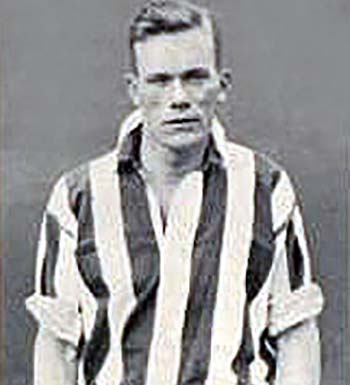WE know Jamie Vardy had it tough.
Released by Sheffield Wednesday as a 16-year-old in 2006, when he joined Stocksbridge Park Steels in Division One South of the Northern Premier League, they paid him £35-a-week for the privilege.
Yet even though he is now among Britain’s elite earners, Vardy's story is an everyman one. He's the English kid who never gave up, the grafter who didn't make it into the mainstream until he was 24 or the Premier League until he was 27.
Now he has made it into history – in 2015 he scored in 11 consecutive Premier League games to surpass the record set by Ruud van Nistelrooy.
Yet one record still has to be broken – Jimmy Dunne's.
The chances are you've never heard of him. The chances are you aren't aware of the short, tragic life he led, how he fought in the War of Independence, how he spent time in an internment camp when he was just 15 years old and how when he was released, he pursued his twin aims: to play Gaelic football for Dublin and soccer for Ireland.
He managed both. And in the months of October, November and December in 1931, he did something else too. He went on a run, scoring in 12 First Division games on the trot for Sheffield United, setting a record that everyone had forgotten about until a little-known striker called Jamie Vardy entered the public's conscience this season.
While Vardy learned his trade in the rough environs of the Northern Premier League, Dunne's sporting upbringing was altogether tougher still. Portlaoise jail – where he was interned for being a member of the IRA – organised five-a-side matches each afternoon. Needless to say, the defenders took no prisoners.
 Leicester's James Vardy (Photo by Laurence Griffiths/Getty Images)
Leicester's James Vardy (Photo by Laurence Griffiths/Getty Images)Released in 1923 – briefly he had been on hunger strike while in prison – Dunne joined Shamrock Rovers before moving across to England to sign for New Brighton. Next came Sheffield United and then, just like Vardy, his career took off when he reached his 24th birthday.
He scored 36 goals in the 1929-30 season, 50 in 1930-31 before getting 33 – and setting that unbroken consecutive top-flight scoring record – in 1931-32.
Significantly, no Irish striker has ever come close to that half-century haul in 1930-31.
How good was he? Good enough for Arsenal – the dominant team of the 1930s – to sign him in 1933. He won the league at Highbury, one of five titles Arsenal claimed that decade, before leaving for Southampton.
If his story ended there, it would have been a good one. But the highlight of his life – never mind his career – was just about to take place. In 1939, months before the outbreak of the Second World War, Dunne travelled to Bremen with the Irish team for a friendly against Germany.
Captain of the side, he spent the previous evening listening to advice from the Irish Embassy. "You must all give the Nazi salute when the anthems are being played," the players were told.
 Jimmy Dunne [Picture source: Wikipedia]
Jimmy Dunne [Picture source: Wikipedia]Most did remember. However, Johnny Carey, the 20-year-old Dubliner, who would later captain Manchester United and fight for the British army in World War II, seeing active duty in the Middle East and Italy, gave the salute.
The tone was set, though. Expected to lose, in front of an audience of 35,000 at Bremen's Weser Stadium, Ireland came from behind to force a 1-1 draw, with an equaliser coming late in the second-half from Paddy Bradshaw.
Dunne, meanwhile, returned to Shamrock Rovers as a player-manager, winning leagues in 1938 and 1939. The outbreak of war may have stopped international soccer, but the League of Ireland continued and in 1943, he finished his playing career aged 37. Six years later, he died of a heart attack and was largely forgotten about for the following 66 years.
New players had emerged. New stories. And then, a Yorkshireman called Jamie Vardy emerged with a rags-to-riches story of his own. As a result, Jimmy Dunne's status as the greatest Irish player we never heard of, finally got told.

